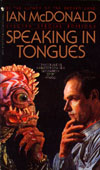
This is a collection of short stories from one of SFs brightest new hopes. I made notes after each individual story as I read it:
- “Gardenias” — Fancifully written, but ultimately plotless. Interesting for the mix of poetry and prose, and the way the narrator speaks to the reader and character. Ultimately not my cup of tea, though.
- “Rainmaker Cometh” — I believe I read this before somewhere (in The Year’s Best Fantasy?). Nicely oblique tale of small-town desperation and the mysterious stranger. Well done, but we’ve seen it all before.
- “Listen” — Okay, it’s obvious that McDonald can write, and can write well and stylishly. But what about plot? What about a little less deus ex machina? What about a little more substance? This story is clearly indicative of my problems so far with McDonald: a lot of style, a lot of imagination, but nothing more on the ball.
- “Speaking in Tongues” — I didn’t follow this story at all. I suspect there was something that tied the parts together, but McDonald gave me no clear clues to find that something. Bleah.
- “Fragments on an Analysis of a Case of Hysteria” — Now this is a story worthy of recommendation. Excellent use of historical and fictional, the hysteria originally unfounded except when the story rolls around and we find out, no, it is merely foreboding. The grafted-on bit with the Wandering Jew could just as well been excised for all that it does (and only served to sell the story originally, to Brian Stableford’s theme anthology Tales of the Wandering Jew). It is the rest that makes this story satisfying.
- “Approaching Perpendicular” — Poetical story about the dreams and agonies of a poet, analogous to the struggles of any artist who braves the fears and sometimes oversteps the bounds in trying to be art. Or perhaps I’m reading too much into it. Perfect prose-poetry, to be so ambiguous, yet allow interpretation.
- “Floating Dogs” — Post holocaust story updated to today’s foreseen technology, nanotech. As such, really nothing new said here.
- “Atomic Avenue” — Nice idea, but seems overlong. Once again, the fine line between mood (poetry) versus information (prose) seems stretched too tightly to the mood side for a story.
- “Fronds” — Well realized alien/human contact, with added development of Chinese/Japanese company rule mirrored in a Dr. Moreau-like Delphic (for dolphins) law. This kind of story has been done better, but not by many, and I found myself thoroughly enthralled by the world-building.
- “Winning” — Well done tale of translating modern culture and mores and positing a prospective future. That is, science fiction. Not as clever as “Fragments,” but very worthy.
- “Toward Kilimanjaro” — Reminiscent of Lucius Shepard & Ian Frazier’s “mutant rainforest” stories, which are probably recalls of Brian Aldiss’ Hothouse. There is a lot of Conrad symbolism here (which I can recognize, even though I’ve never read Conrad). What is it about Heart of Darkness that appeals so to the SF spirit? Interesting, but overlong to be so unoriginal in plot.
Overall, I enjoyed the McDonald collection, even though when I look back over my notes, I would only recommend half of the stories (and that to a dedicated reader of SF). He’s got real style, though–a talent with words–that will prove to be useful in the future when his plots and ideas become more original than the recycled ones in these stories.
[Finished 28 January 1993]
